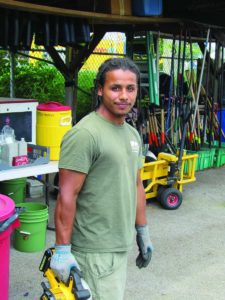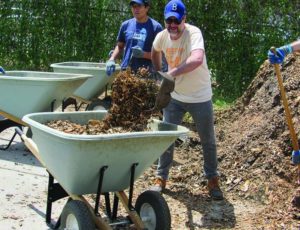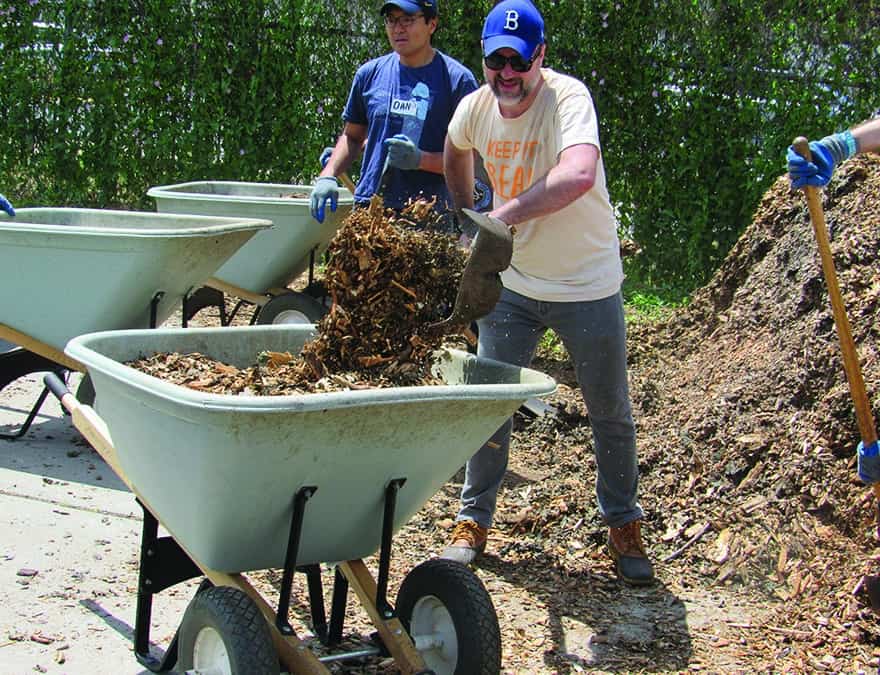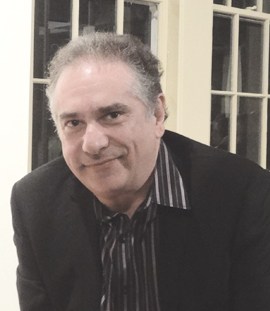by Erin DeGregorio

worked under David Buckel, has now taken
over his duties. (photo by George Fiala)
The Red Hook Community Farm, operated by Brooklyn Botanic Gardens and Added Value has officially welcomed the warm weather with open arms after holding its first Farmers Market for the 2018 season.
Held on June 16, the farm stand brought community members together to celebrate the beginning of summer and showed what the neighborhood has to offer in terms of fresh, affordable produce.
“The farm stand turnout was great,” says Brendan Parker, Red Hook Community Farm’s manager and an Added Value Farms team member. “We only expect it to get better as the season rolls on.”
Added Value Farms is a youth-centered urban farming and food justice non-profit that also cultivates the soil and grows the farm’s food. It creates opportunities for teens to expand their knowledge base, develop their leadership skills, and positively engage with each other, their community, and the environment. This non-profit also partners with the Red Hook Community Supported Agriculture (Red Hook CSA) to offer a weekly produce share of locally grown vegetables.
According to Parker, radishes, turnips, lettuce, kale, Swiss chard, tomatoes, and eggplants are currently
growing in the 2.75 acre farm.
This year also features the pop-culture naming of certain fields within the site – “Wakanda 1,” “Wakanda 2” and so on, for example, handwritten on brown posts at the beginning of particular rows. Saara Nafici, executive director of Added Value Farms, says the youth farm apprentices decided to name the beds Dino, Wakanda, Tomato Town and Groot – some after popular settings and characters found in Epic Games’s survival video game “Fortnite,” and Marvel’s blockbuster movies “Black Panther and “Guardians of the Galaxy.” This was an idea of the young workers.
“The heart and soul of the Red Hook Community Farm are the youth farm apprentices who are hired from the neighborhood and learn all aspects of running an urban farm – from seeding to harvesting to sharing the produce with their community.”
Remembering David Buckel:

@tsunchuehhuang)
David Buckel, who made a political statement earlier this year by selfimmolating in Prospect Park, founded the composting area of the farm. Sandy had devastated the entire farm in 2012, flooding what had been fertile soil with salt water, which ruined it for growing. The farm made a deal with the Department of Sanitation, who wanted a place to bring organic wastes for composting. The resulting rich soil was used to reactivate the farm and is also available for free to community gardens throughout the city.
Domingo Morales, an overseer of the Red Hook Community Farm and an Organics Recovery Coordinator with the Brooklyn Botanic Gardens, knew Buckel well. Before joining the site as a Green City Force volunteer, when he was a part of the AmeriCorps program, three years ago, Morales binged Buckel’s YouTube composting videos and kind of memorized everything he said.
“My first impression of David was this guy must really really care because nobody that I knew was just doing what David was doing. [He] was really trying to change the world through a composting perspective,” Morales says. “I was just so surprised at how unique and organized he was, and I was kind of finishing his sentences the first time I met him.”
Soon after Morales began to help Buckel wrap up whatever project he and his team were working on during his lunch breaks, and would also volunteer on his days off. From then on Buckel became his mentor.
“I had a lot of energy and didn’t know what to do with it. I got aggravated with a lot of social issues and environmental issues I was learning about and he helped me through my frustration,” he says. “He was always trying to get me a step higher than where I was.”
Morales says also Buckel taught him the ins-and-outs of composting, the proper terminology and the science behind composting through the years. He believes that had Buckel not encouraged him to strive and do better, he would have quit two years ago and would not have pursued composting as a career.
The farm has a big picture of Buckel, watering a windrow, in his memory. Morales says the picture was originally ziptied to the chain-linked fence surrounding the farm, but had fallen down. Now he has to use metal ties to make sure that never happens again. “When it fell down I took that as a sign of David saying, ‘Hey how about metal this time,” Morales says with a laugh. In the last few months Morales has continued to keep the farm running–including keeping the site neat the way Buckel always kept it – and strives to make it better in Buckel’s honor. “For me [his passing] makes me want to work even harder, makes me want to do more – to do as much as I can. I never want to do the bare minimum,”
Morales says.
Nafici also says that his presence and absence has been deeply felt on the farm since his passing. She also referred to Buckel as a “tireless and passionate environmental advocate who elevated community composting to an exquisite art form at the Red Hook Community Farm” on the group’s digital platforms.
How to get involved:
 The Red Hook Community Farm is located near IKEA, at 560 Columbia Street (at the corner of Columbia and Sigourney Streets).
The Red Hook Community Farm is located near IKEA, at 560 Columbia Street (at the corner of Columbia and Sigourney Streets).
The farm stand will be held every Saturday, 10 a.m.-3 p.m., until November 17 (excluding September 1) – cash, debit/credit, EBT, WIC, HealthBucks and FMNP vouchers are accepted, according to the official website. Additionally a new farm stand will be launched on Wednesday evenings starting in August, next to the Joseph Miccio Cornerstone Community Center. Nafici says there will be lots of fresh vegetables like peppers, tomatoes and greens galore and that there will be special off ers for Red Hook Houses residents. Plus, starting this month, the farm will be offering free weekly cooking demonstrations – where participants can receive Health Bucks redeemable for produce.
To learn more about volunteering and helping out, stop by the farm any Saturday morning. For additional information about the farm, Added Value and the Red Hook CSA, go to addedvalue.org/csa/.
Author
-

George Fiala has worked in radio, newspapers and direct marketing his whole life, except for when he was a vendor at Shea Stadium, pizza and cheesesteak maker in Lancaster, PA, and an occasional comic book dealer. He studied English and drinking in college, international relations at the New School, and in his spare time plays drums and fixes pinball machines.
View all posts
George Fiala has worked in radio, newspapers and direct marketing his whole life, except for when he was a vendor at Shea Stadium, pizza and cheesesteak maker in Lancaster, PA, and an occasional comic book dealer. He studied English and drinking in college, international relations at the New School, and in his spare time plays drums and fixes pinball machines.










